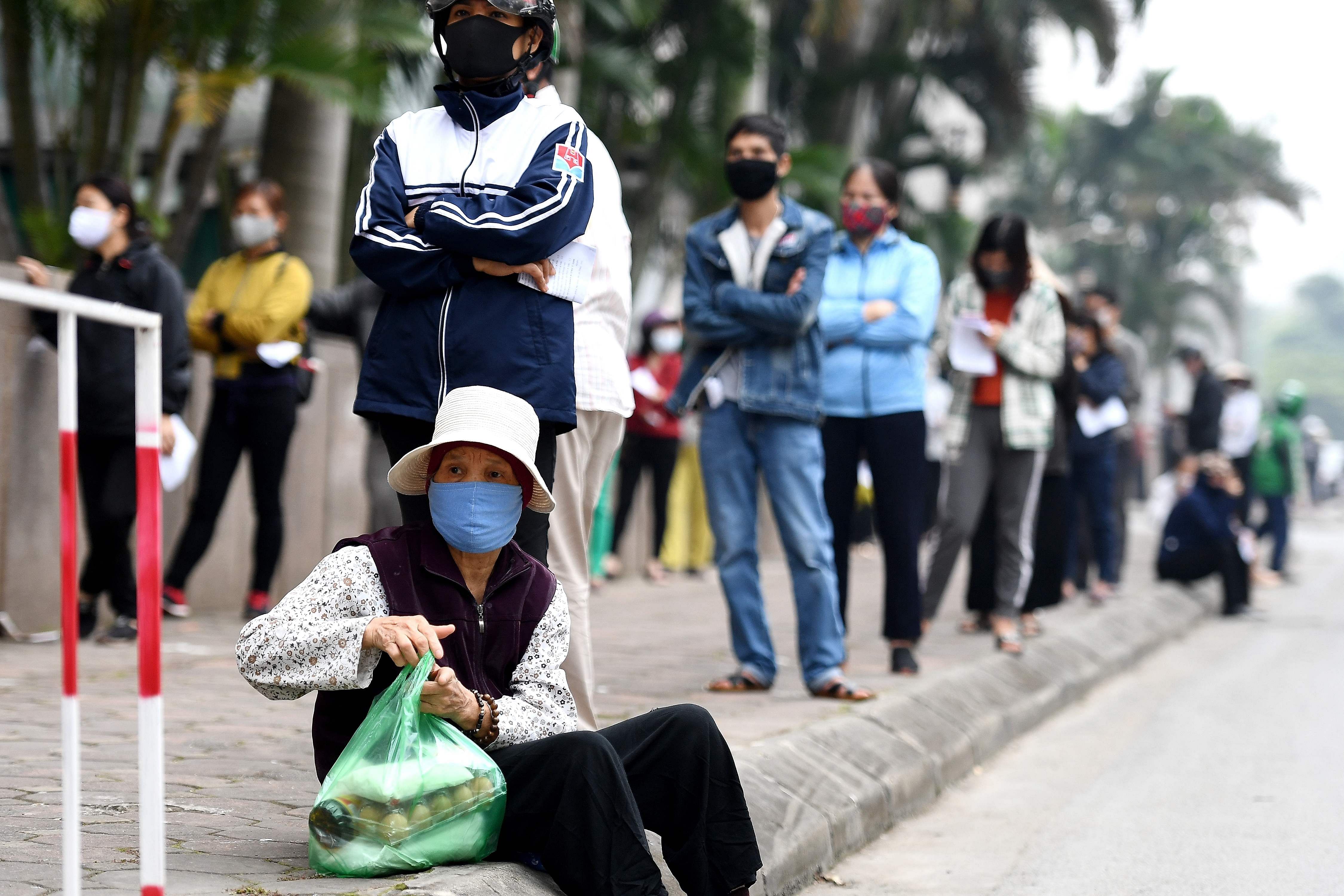Cautiously, a fiscally constrained Vietnam eases two-week nationwide lockdown
Sign up now: Get insights on Asia's fast-moving developments

People wearing face masks practice social distancing in Hanoi on April 16, 2020.
PHOTO: AFP
While it may be too early to count victories in this coronavirus pandemic, Vietnam has probably moved further than its South-east Asian neighbours along this front.
On Thursday (April 16), as a two-week long nationwide lockdown lapsed, Hanoi extended stringent restrictions on only 12 "high-risk" cities and provinces out of 63. Another 16 medium-risk localities had more leeway in opening stores in non-essential goods and services.
The country's total cases of infection: 268.
Governments in neighbouring countries have been busy enforcing movement restrictions or expanding them. Myanmar lengthened its facility quarantine period for returnees from 14 days to 21. Laos extended its nationwide lockdown by two weeks to May 3. Indonesia enlarged the scope of the Jakarta lockdown to include nearby cities.
Vietnam's cautious reinstatement of commercial life will be instructive as governments elsewhere have been forced to weigh the health threat posed by Covid-19 against the economic pain of containing the virus via lockdowns.
Analysts largely agree that Vietnam, with one of the lowest per capita gross domestic products within Asean, has punched above its weight in terms of its response to the pandemic.
"Authorities have exceeded expectations on that front and were quick to close borders and restrict movement in areas of the country where clusters of cases were developing," says Eurasia Group analyst Peter Mumford.
Results of a 12-country opinion poll by Ipsos Business Consulting showed that "Vietnam people have a general positive sentiment towards Vietnam state measures", its country head, Mr Phong Quach, told The Straits Times.
In its March 12-14 survey, well over 80 per cent of Vietnamese respondents expected things to return to normal by June, making them more optimistic than respondents in the United States, Italy, France, Russia, Japan and India.

People wearing face masks practice social distancing in Hanoi on April 16, 2020.
PHOTO: AFP
Yet the survey also reflected growing anxiety about the financial fallout. Vietnam tied with China in having the largest proportion who felt that the coronavirus would have a financial impact on them and their family. Some 64 per cent felt that the virus posed a "high" or "very high" threat to their job and business.
Millions of jobs are at stake in Vietnam, one of the world's largest garment exporters, as fashion firms in Western markets cancel orders or hold up shipments of completed goods.
Unlike Thailand, which is giving out a 5,000 baht monthly support for those who lost their jobs, and Singapore, which has various financial reliefs including a one-off $600 handout to every adult to tide over this period, Vietnam has considerably less fiscal means to extend long-term bailouts because it consistently runs up budget deficits, say economists.
Earlier this month, Prime Minister Nguyen Xuan Phuc approved a relatively modest 62 trillion dong (S$3.7 billion) bailout package that would, among other things, give employees who had their work contracts suspended 1.8 million dong a month, for up to three months.
But economists say the size of its informal economy - estimated at 30 per cent of its GDP - also makes it difficult for aid to reach the hardest hit. Workers in this category include street vendors and waiters in small restaurants.
"The government's policy cannot reach these people, because they do not belong to any target group specified," said Dr Pham The Anh, who heads the macroeconomics unit at the National Economics University in Hanoi.
"They do not have labour contracts and are not classified as people losing their jobs. They do not belong even to what are classified as 'poor' households."
The Vietnam government, "quite sensitive to the criticism from the public", faces a dilemma, says Dr Nguyen Duc Thanh, founder and chief adviser of the Viet Nam Institute for Economic and Policy Research.
With its daily increase in new infections steadily kept low, Hanoi is in relatively uncharted territory. It needs to keep the public optimistic enough to shoulder the temporary financial pain, while relaxing lockdown measures to restore livelihoods and stave off a sudden surge of cases that would reignite public concern, says Dr Thanh.
"The situation needs to be handled very skilfully, given the finances of this government is very limited," says Dr Thanh. "So far it has done quite well, but… nobody knows how long this will go on."


